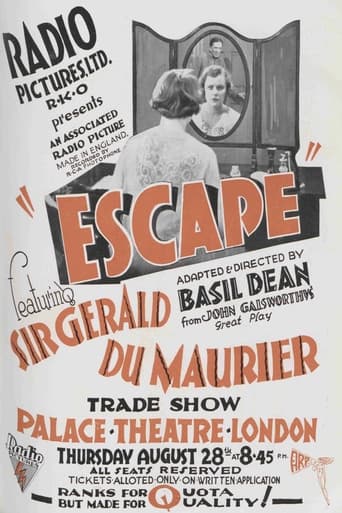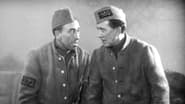Lucy-Lastic
This is the first film on Volume One of The Ealing Studios Rarities Collection that I have been collecting over the last 5 years or so and on viewing it as the first one I then had doubts as to should I have invested so much money in getting the whole set because to be quite frank this film is awful!! And I simply do not understand why the other reviewers gave it a favourable write up.Wooden acting, stilted dialogue, it made me think I was watching a film of some local AmDram production that had spilt over from the local village hall into the village and local countryside.Interesting to see Gordon Harker in a small part before his excellent Inspector Hornleigh three (only!) films and a barely recognisable Nigel Bruce who went on of course to be the bumbling Dr Watson to the excellent Basil Rathbone's Sherlock Holmes (in my opinion the best). So, apart from having a cigarette named after him and fathering Daphne Du Maurier, Sir Gerald should have stayed the other side of the camera as far as I am concerned.
malcolmgsw
The noted theatre director,Basil Dean,helped form Associated Talking Pictures and built new sound stages at Ealing Studios.He signed a distribution contract with Radio Pictures ,the British subsidiary of RKO,with the hope of producing prestige British films.The cast for this film easily convinces one of that fact.However what RKO had in mind is that this would be a way of complying with their quota requirements,so the films from Ealing could go out on the bottom half of a double bill with one of their Hollywood films.So it was not a surprise that a parting of the ways came a couple of years later for RKO and 5 years later for Dean after a string of disastrous flops,mainly starring his wife. This film is more interesting for the cast than for the content.As has been pointed out in another review Mabel Poulton coming to the end of her screen career halted by her voice.Other actors such as Nigel Bruce,Ian Hunter and Madelaine Carroll on their way up. Du Maurier is excellent,even if a bit unlikely as the convict.Whilst the film creaks with age nevertheless it is very watchable.
Spondonman
The credits at the beginning state this was the first Associated Radio Picture, made in Britain under Basil Dean under the supervision of Americans. All the wonderful ATBP/Ealing films were still ahead - alas, now they're so far behind. This is age worn and creaky like most of us get but still interesting and entertaining on a simple level all the way from a simpler world, John Galsworthy's world of the stage in 1920's England.A rather enigmatic war hero Captain gets briefly embroiled with a woman of the night culminating in the death of an officious policeman and the Captain being given five years hard. After two years of being treated like a dog his red and blue Blood rose to help his escape. The film is him on the run and those who helped or hindered him. It's a fascinating and bumpy journey through the British countryside, various yokels and sports, their customs and the moral dilemmas suddenly thrust on them, with a marvellous British cast many of whom were just starting on their careers. Stalwart Gordon Harker was there with his best gord bless you sir support to his toffy felon friend; Madeleine Carroll, Felix Aylmer, PC Nigel Bruce, padre Austin Trevor all briefly making their appearances, but none as brief as PC Ian Hunter though. And all of whom appeared to outshine Sir Gerald du Maurier, on ATBP's Board Of Directors with Basil Dean – from the meagre three films I've ever seen of his I charitably assume he was a much better stage actor, because if he "had a subtly realistic acting style" (per IMDb bio) it didn't show on the screen. In fact, quite the contrary. Only his higher class was apparent; note he couldn't let a perceived member of his class lie on his behalf even though other more mere mortals already had - ethics then as now are to be reserved for our Betters. After all it can be so dehumanising to play a human fox.Some nice photography although I think the copy I saw was square (was it cropped?) and occasionally some decent acting make this worth watching. It ain't The Fugitive - or even A Cottage On Dartmoor for that matter - but this is still an excellent film for those of us patient, charitable or nostalgic enough for a touch of old fashioned escapism.
drednm
Interesting Brit talkie starring Gerald du Maurier as a prison escapee. The film is also notable as the beginning of the end of Mabel Poulton's career. She gets second billing after 2 talkie bombs in 1929. But her billing is misleading as the billing is based on order of appearance. While she is perfectly fine as "Girl of the Town," it's obvious that her speaking voice undermines her silent-screen image, especially as Tessa in The Constant Nymph. She never had another leading role in a feature.Poulton aside, what we get is the perfect Hitchcock theme sans Hitchcock. After an extended British hunt scene showing du Maurier as a sensitive soul (he feels sorry for the fox because he himself had escaped the Germans in the war), we see him accosted by Poulton in Hyde Park. Nothing happens but a cop (Ian Hunter) tries to arrest her for soliciting. Du Maurier intervenes and strikes the cop. He falls, hits his head on a wall and dies. Du Maurier is sentenced to 5 years. He escapes and the rest of the film follows his flight across the moors and the people he meets.Du Maurier was a legendary actor of his time, knighted in 1922, and totally forgotten now. He made only 10 films and this was his talkie debut. So while the film marks a solid starring talkie debut for du Maurier, it also signals the complete collapse of Mabel Poulton's film career (she having been one of England's biggest silent stars).Also in the cast are Edna Best, Madeleine Carroll, Nigel Bruce, Gordon Harker, Austin Trevor, Marie Ney, Jean Cadell, and Felix Aylmer.




